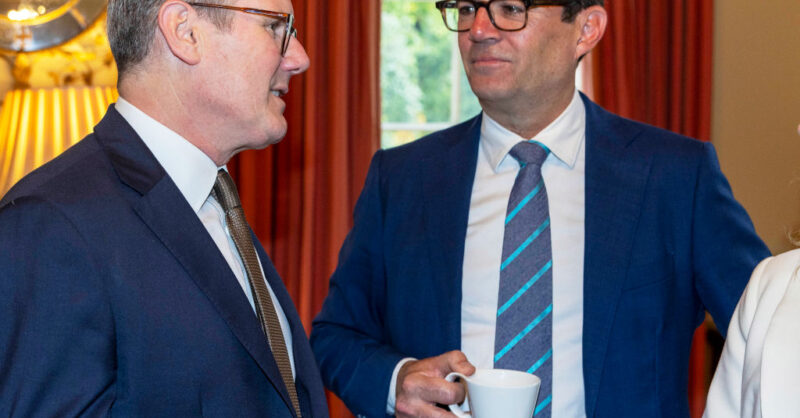
Photo by Ian Vogler – WPA Pool/Getty Images
Where is the soft left? This was the question that supporters and opponents of this group alike asked during Labour’s first year in power. There was no shortage of new organisations launched – a revived Blue Labour, the Labour Growth Group and the Red Wall Group among them – but the soft left wasn’t at the centre of any of them. Faced with policies such as foreign-aid and welfare cuts it appeared lost and devoid of leadership.
The aim of Mainstream, which launches today, is to change this. The new organisation (previewed in my column two weeks ago) was founded by Compass, established in 2003 to champion alternatives to Blairism, and Open Labour. Key backers include Andy Burnham, Clive Efford (chair of the hundred-plus Tribune Group of MPs), former cabinet ministers John Denham and Clare Short, Stewart Wood (Ed Miliband’s intellectual consigliere), the Blue Labourite Jon Cruddas, Geoff Mulgan (Tony Blair’s former policy director), MPs Clive Lewis, Dawn Butler, Paula Barker, Olivia Blake and Alex Sobel, and the former Momentum chair Jon Lansman. In other words, it represents a coming together of Milibandites, the left wing of New Labour and the more pluralistic wing of Corbynism.
Luke Akehurst, one of the mainstays of Labour First, the “old right” activist group, comments: “I hope this new grouping will focus on promoting positive policy ideas that the government might consider rather than factional organising in opposition to the leadership internally within the party.”
But Mainstream’s purpose isn’t merely to be an intellectual talking shop. It argues that “the top of the Labour Party is now wildly out of step with the majority in the Labour Party” and warns that “without a dramatic course correction, the Labour government will fail to transform the country and will be defeated by Reform UK”.
By far the most significant political fact is the involvement of Burnham, a one-time Blairite turned soft-left darling. Back in May, when he addressed the Compass conference, the Manchester mayor made what I identified at the time as a leadership pitch, championing a “popular left programme” in deliberate contrast to Keir Starmer. As Labour’s woes have deepened, that’s an offer that has attracted increasing attention. “Burnham is proving himself to be popular in the party and is seen to have the character and politics to win the country,” Neal Lawson, Compass’s founder and director, told me last month (Burnham has a +78 favourability rating among members). “I meet a lot of people in Labour increasingly willing this to happen.”
Is Mainstream, then, the activist wing of a future Burnham leadership campaign? (Just as the Labour Together group provided the nucleus for Starmer’s bid.) That’s what some involved happily confirm. “If Burnham is the soft left and left’s best hope of survival then that makes Mainstream key to organising to get him back in and winning the leadership,” one MP tells me.
This, by the way, is the prism through which MPs see the mayor’s rapid intervention in Labour’s looming deputy leadership contest. Burnham yesterday told Laura Kuenssberg that he would favour either Louise Haigh (who writes for us today) or Lucy Powell – two northerners expelled from Starmer’s cabinet – for the job. Among the benefits of the role is a seat on Labour’s National Executive Committee (NEC), the body that oversees candidate selections and which some believe could thwart Burnham’s route back to parliament. But with a trusted ally as deputy leader, the mayor’s path to Westminster becomes less perilous. “It would give Andy a bridgehead into the NEC,” observes an MP. Here is just one reason why the deputy leadership contest will shape Labour’s future.
Subscribe to The New Statesman today from only £8.99 per month
This piece first appeared in the Morning Call newsletter; receive it every morning by subscribing on Substack here
[See also: Zarah Sultana: “Labour is dead”]
Content from our partners


